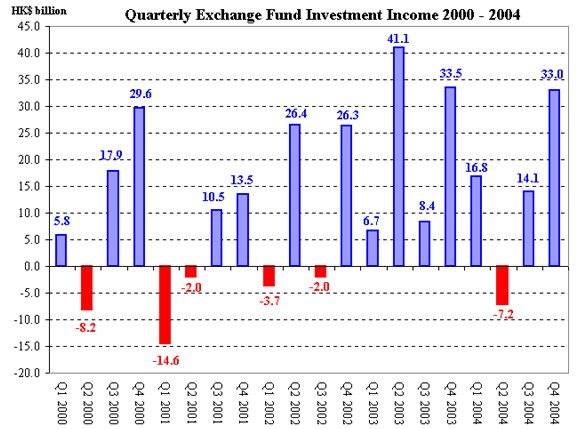During a year of extreme volatility, the Exchange Fund recorded an investment income of HK$56.7 billion in 2004.
The experience of investment management of the Exchange Fund in the past year was one akin to riding on a roller-coaster. This is notwithstanding the rather conservative investment benchmark determined by the Exchange Fund Advisory Committee. Financial markets were very volatile during the year. Because of the high liquidity requirement imposed on the Exchange Fund, having regard to the statutory purpose of the Fund, there is a need to mark all the Exchange Fund's assets to their market values at the time of reporting. The quarterly investment income from 2000 to 2004 shown in the chart below reflects the extent of the volatility in the markets in which the Exchange Fund has investments.

Readers will remember my frequent reminders about financial market volatility. These are given both to increase public understanding of how the Exchange Fund is managed and to alert authorized institutions of our concerns, as supervisor, about the proper management of market risks of the financial assets they increasingly are holding, given the shortage of lending opportunities. Some may remember the message I publicly conveyed in May last year that the substantial investment return earned in the first quarter of the year having disappeared in April. Volatility continued to be high during the rest of the year, to the extent that if the year were longer or shorter by a mere two weeks the investment results for the year would have been very different.
As things turned out, however, the Exchange Fund recorded an investment income of HK$56.7 billion in 2004, with gains in all categories of financial assets. The total return from bonds was HK$25.0 billion, with interest income of HK$27.0 billion offset a little (HK$2.0 billion) by revaluation losses due to the fall in bond prices along with rising interest rates. Hong Kong equities produced an investment gain, including dividends, of HK$12.0 billion. Foreign equities produced a gain of HK$11.2 billion. Weakness in the US dollar, occurring mostly towards the end of the year but now partly reversed, has enabled a foreign exchange gain of HK$8.5 billion.
The Exchange Fund is not an ordinary investment fund. It was established for well-defined purposes, which are laid down in the Exchange Fund Ordinance, and the maximisation of investment return, while desirable, is not among those purposes. The ability of the Exchange Fund to "affect the exchange value of the currency of Hong Kong" and to "maintain the stability and the integrity of the monetary and financial systems of Hong Kong" is of over-riding importance. And the Exchange Fund has to be managed accordingly, with stringent emphasis on capital preservation and high liquidity.
What members of the public may be particularly interested in is whether or not the share of investment return for the fiscal reserves has met the "target" of HK$12.3 billion set in the government's 2004-05 budget. I appreciate the need, for budgetary purposes, to include a forecast figure on the investment income of the fiscal reserves. I also support the use of a figure representing the long-term trend established in the past, rather than attempting each year to forecast financial market performance. That, to all familiar with financial markets, is an impossible task. But, as far as the HKMA is concerned, it is inappropriate for the budget figure to be considered a target, in the sense of being a performance measure of the Exchange Fund. Having said this, I am pleased to say that the share of investment return for the fiscal reserves in 2004 is HK$14.5 billion, HK$2.2 billion higher than the budgeted figure.
Lastly, the size of the Exchange Fund stood at HK$1,061.9 billion at the end of 2004. Its Accumulated Surplus stood at HK$423.4 billion. These substantial figures continue to help safeguard the exchange value of the currency, and the stability and integrity of the monetary and financial systems of Hong Kong.
Joseph Yam
20 January 2005
Related Press Release:
Click here for previous articles in this column.
Document in Word format


